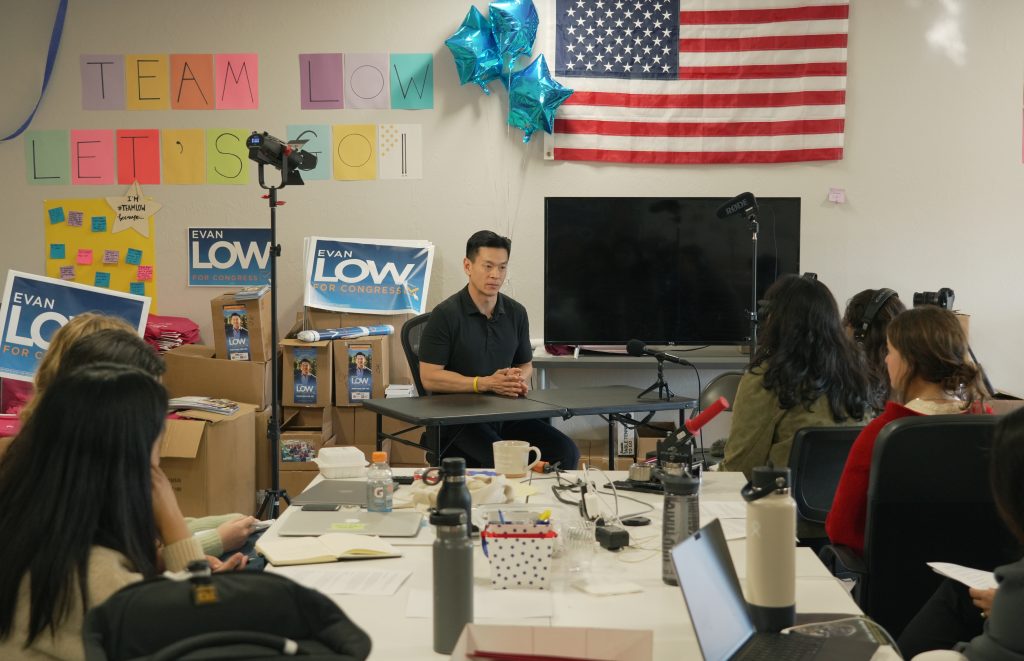
district, spoke about public safety, artificial intelligence and defending democracy in an Oct. 24 interview with Peninsula Press. (Bhabna Banerjee/Peninsula Press)
SAN JOSE – In a final plea to voters, Assemblymember Evan Low, who is running to represent California’s 16th district against a fellow Democrat, invoked his personal identity, saying, if elected, he would be the first Chinese-American and the first openly LGBTQ+ member of the U.S. House of Representatives from Northern California.
Representation matters “not just for empty tokenism, but [for] what we will do in advancing these issues,” Low said. “There is so much more to a representative than just simply a vote. There is the leadership capacity to which we can inspire young generations and what kind of movement we build and bring.”
While his opponent, former San Jose Mayor Sam Liccardo, leads in the polls, Low is hopeful that higher turnout among young voters will propel him to victory on Nov. 5.
Low, 41, and Liccardo, 54, are vying for a seat in Congress to represent the state’s 16th district, which is open for the first time in three decades following Rep. Anna Eshoo’s retirement announcement last year. The district includes parts of San Mateo and Santa Clara counties.
In an extensive interview with the Peninsula Press on Oct. 24, Low stressed his progressive values and ideas that could uplift the middle class in a high-cost-of-living area. Among these are free community college and universal healthcare.
“The problem is that everyday Americans struggle between putting food on the table, or the price of their medication, especially for those who may be uninsured or unemployed,” he said.
Additionally, Low said Congress could pass carrot-and-stick policies to increase the supply of market rate and affordable housing nationwide. California law requires that 15% of new residential developments of five units or more must be affordable for low-income households.
The federal government could withhold funding, Low said, from cities that do not meet these housing development and affordable housing requirements. Low also supports Vice President Kamala Harris’ $25,000 down payment assistance plan for new homebuyers.
Misinformation causing polarization
Low said misinformation is the “number one contributor” to increased polarization across the country. Social media and algorithms feed “a known loop” of misinformation, he said. Low urged voters to get out of their silos and urged greater civics education to “empower young people to think critically.”
Low supports repealing Section 230 of the Communications Act of 1934, which, as it currently stands, shields platforms from liability over user content. Opponent Liccardo also supports repealing Section 230. Federal legislators introduced a bill in 2021 to repeal Section 230, but there has been no further action.
Funding police
Low called for increased funding for police departments to develop more sensitivity training. He said defunding the police in California would be catastrophic and lead to lower response times.
Low co-authored SB 29 in 2015, which requires sensitivity training for peace officers through the Peace Officers Standards and Training program. Low said the training will help officers “understand how to work with members of the LGBTQ+ community.”
“It is a fundamental role of the government in keeping our communities safe,” Low said.
As a progressive Democrat, Low said he understands why underserved communities might be hesitant to connect with police officers, particularly due to language and cultural barriers. Low’s brother Ryan is a San Jose police officer.
“I want to see more peace officers reflecting the communities and also being born and raised in their communities as well…to have a sense of pride and ownership of those communities as well,” Low said.
Democracy post-election
As he campaigns for a seat in a fractured Congress, Low emphasized that “post-election, no matter what, we will need much healing.”
“The other side will feel slighted, hurt. These fears are important to acknowledge,” he said, adding that it will be “crucial for us, as active citizens, to demonstrate grace and empathy towards one another as fellow Americans.”
While Low said he was confident Harris would win the presidential election, he stressed the importance of not losing sight of those who supported other candidates, urging efforts to build bridges and find common ground where possible.
Locally, Low said voters should think critically about who is paying for attack ads, including one funded by Super PAC Neighbors for Results, which claimed he had missed assembly votes for travel while in office. The Super PAC has received $2 million from Bloomberg LP, of which $323,952 was spent against Evan Low, according to the non-profit OpenSecrets.
“I think it’s funded by an out-of-state billionaire trying to buy an election in support of my opponent,” Low said of the attack ads.

district, spoke about public safety, artificial intelligence and defending democracy in an Oct. 24 interview with Peninsula Press. (Bhabna Banerjee/Peninsula Press)
A group of House Democrats shared a public letter on Oct. 16 alleging Low used state campaign funds to boost his federal election. This came after Defend The Vote, a voting advocacy group, filed a complaint to the FEC to investigate Low’s campaign expenditures.
All Democrats signed on to the letter have endorsed Liccardo’s campaign. Lam Nguyen, Low’s deputy campaign manager, accused Liccardo’s team of planting this as a distraction.
“The funds that are in question are state funds for state purposes activities solely. They are not permissible to be used to advance a federal candidacy,” Low said in the interview.
“That is very clear, and I abide by those principles and those rules,” he added.
The Peninsula Press interviewed Liccardo on Oct. 17.
This story was reported by: Bhabna Banerjee, Hannah Bensen, Sana Dadani, Michaela Herbst, Rebecca Jattan, Itzel Luna, Neha Mukherjee, Arundathi Nair, Chikodi Ohaya, Anastasia Sotiropoulos, Nina Subkhanberdina, Hina Suzuki, Sasha Tuddenham, Audrey Widodo, and Hannah Woodworth.
